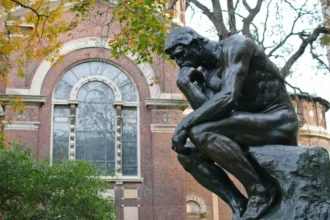The Spanish series “Money Heist” (“La Casa de Papel”) achieves more than just keeping audiences on the edge of their seats. It serves as a nuanced lens to examine crucial societal issues like human rights and the dangers of authoritarianism. The series crafts a compelling narrative filled with morally complex characters and high-stakes scenarios. This narrative is not confined to the realm of fiction; it mirrors real-world challenges, thus making the series a rich object of study.
- Methodological Rigor: Blending Fiction with Reality for Insights
- Human Rights and Fictional Narratives: Making the Abstract Concrete in Money Heist
- The International Human Rights Framework: A Lens for Accountability
- Spain’s Citizen Security Law: A Real-World Case Study
- The Reality Behind the Fiction: More Than Just Entertainment
- Conclusions: The Inherent Conflict Between Authoritarianism and Human Rights
Our approach to studying “Money Heist” is multifaceted, blending bibliographic research with thematic analysis. By pulling from diverse sources like academic texts, legal documents, and other empirical studies, we offer a comprehensive view of the human rights issues presented in the series. Our research doesn’t merely dissect the storylines and character arcs. It places them within a larger sociopolitical context, effectively bridging the gap between entertainment and serious academic discourse.
We focus on how the series articulates the tension between individual freedoms and state authority. Characters in “Money Heist” often find themselves in situations where their basic human rights are in jeopardy. Whether it’s police using excessive force or the government manipulating laws, these fictional situations resonate deeply because they reflect ongoing challenges that real-world societies face, especially in Spain with its own history of authoritarian rule.
Methodological Rigor: Blending Fiction with Reality for Insights
Understanding the depth and complexity of human rights and authoritarianism calls for an equally comprehensive methodology. Our approach to studying “Money Heist” is not solely confined to the episodic events and dialogues that unfold on screen. Instead, it is a meticulously designed mix of bibliographic research and thematic analysis. We delve into foundational academic texts, legal documents, and empirical studies to supplement the show’s narrative. This interdisciplinary method enables us to achieve a robust understanding of the dynamics between human rights and authoritarian practices.
The protection of human rights isn’t just a matter for the courts or government bodies; it’s a collective responsibility.
The use of multiple source types adds layers to our investigation. Academic works offer theoretical grounding, legal documents bring in statutory insights, and real-world case studies provide empirical evidence. This multi-pronged approach equips us with the tools to discuss the subject matter with both depth and breadth.
Crucially, our methodology transcends mere academic exercise. By linking “Money Heist” to actual laws and real-world events, our study is not abstract but grounded in human experience. Characters in the show navigate ethical and legal dilemmas that parallel challenges in real societies, especially Spain’s struggles with authoritarian vestiges.
So, our method doesn’t just dissect fictional narratives; it positions them within the real-world tapestry of human rights and state power. In doing so, our study elevates “Money Heist” from a binge-worthy series to an instrumental resource for understanding some of today’s most pressing issues.
Human Rights and Fictional Narratives: Making the Abstract Concrete in Money Heist
The show “Money Heist” successfully transforms abstract principles of human rights and state authority into palpable, relatable scenarios. The characters don’t just steal money or execute a plan; they navigate a labyrinth of moral and ethical challenges. They often find themselves in situations where their fundamental rights are under threat, paralleling real-world dilemmas.
This approach serves two purposes. First, it makes the concept of human rights accessible to a broader audience. Legal terminologies and political theories often distance people from the urgency of these issues. “Money Heist” bridges this gap by embedding these themes into its plot, making them relatable and understandable for the layperson.
Second, the show serves as a cautionary tale. Lack of oversight and accountability can result in the erosion of human rights, not just in authoritarian regimes, but also in democratic societies. The characters’ ordeals aren’t isolated incidents in a fictional world; they are symbolic of larger societal issues, reflecting challenges that real people face in various parts of the world.
The International Human Rights Framework: A Lens for Accountability
“Money Heist” not only entertains but also emphasizes the importance of an existing, intricate system designed to protect human rights globally. This is the International Human Rights Protection System, which functions as a comprehensive framework for safeguarding human dignity. Central to this are instruments like the Convention Against Torture, which serve as binding norms among nations.
Democratic settings are not immune to authoritarian impulses.
The show brings unique relevance to this system, demonstrating how even fictional characters can face treatments that would be considered unlawful under international laws. These scenarios underscore the system’s real-world importance. They serve as vivid reminders of what can happen when such protective measures are overlooked or intentionally disregarded.
Why is this significant? It highlights that the protection of human rights isn’t just a matter for the courts or government bodies; it’s a collective responsibility. The show’s dramatization serves as a wake-up call, illustrating that the negligence of international human rights can lead to severe consequences for individuals, regardless of their jurisdiction.
In this way, “Money Heist” serves a dual role. It not only provides compelling storytelling but also acts as a conduit for discussing the merits and imperatives of a system designed to protect us all. It reminds us that upholding these norms is not just the task of a few but a united, global effort that must be consistently maintained.
Spain’s Citizen Security Law: A Real-World Case Study
The series also tackles the troubling interface between human rights and state authority, which finds a real-life parallel in Spain’s controversial Citizen Security Law. Commonly known as the “Gag Law,” this 2015 legislation limits public protests and even peaceful gatherings, empowering police to disband them often with threats of hefty fines.
By addressing topics like public protests and state control, “Money Heist” offers a direct commentary on laws that stifle individual freedoms in the guise of maintaining public order. The law serves as an ominous reminder that democratic settings are not immune to authoritarian impulses. The ongoing protests and legal battles surrounding this law indicate a society wrestling with the limits of state authority and individual freedoms.
What does this say about Spain and, by extension, any democracy? It tells us that laws can be used to suppress dissent and can tilt the societal balance toward authoritarianism. This has ramifications not only for Spain but for any democratic society, raising red flags about how laws can be weaponized against the citizenry.
Thus, “Money Heist” serves as a narrative mirror reflecting real concerns about the erosion of human rights and the resurgence of authoritarian tendencies, even in democracies. The show acts as a cautionary tale, alerting us to stay vigilant against such erosions in our respective societies.
The Reality Behind the Fiction: More Than Just Entertainment
“Money Heist” dives deep into Spain’s socio-political issues, effectively blending drama and reality. While the country has transitioned from authoritarian rule to democracy, the echoes of its past are still felt today, notably through the controversial Citizen Security Law, also known as the “Gag Law.” This law places significant restrictions on public protests and gatherings, demonstrating that the struggle for human rights is far from over, even in democratic countries.
The show excellently captures this complex tension. Characters frequently face ethical dilemmas and human rights infringements similar to real-life events in Spain. Issues like police brutality and state violence aren’t just plot devices; they mirror current affairs and fuel public debate.
The resonance of these themes extends beyond the fictional universe of “Money Heist.” They compel us to scrutinize our own societies’ human rights conditions and provoke thought about what we can do to improve them. It isn’t just a thrilling drama; it serves as a lens through which we can examine pressing issues like human rights and authoritarianism, making it both entertaining and enlightening. The show warns us of the risks that come with unchecked state power, urging us to be proactive and vigilant in defending our freedoms.
Conclusions: The Inherent Conflict Between Authoritarianism and Human Rights
Our multifaceted analysis reveals a profound incongruity between authoritarian practices and the preservation of human rights. In the world of “Money Heist,” this tension is palpable. The series acts as a microcosm, shedding light on broader issues not just in Spain, but globally. It serves as a clarion call, urging us to remain vigilant and proactive in defending the universality of human rights.
In an era where ideological divides seem insurmountable, the protection of human rights must stand as a non-negotiable, universal endeavor. “Money Heist” adds a layer of urgency to this fight, showing us what’s at stake when authoritarian tendencies go unchecked. This isn’t a struggle confined to specific regions or political systems; it’s a global challenge that demands our constant attention.
The series transcends its role as entertainment, compelling us to confront and address the state of human rights in our societies. It serves as a poignant reminder that the fight against authoritarianism is a daily battle, one that must be waged in every corner of the globe, regardless of our cultural or political affiliations.
Adapted from an academic study for a wider audience, under license CC BY NC SA









